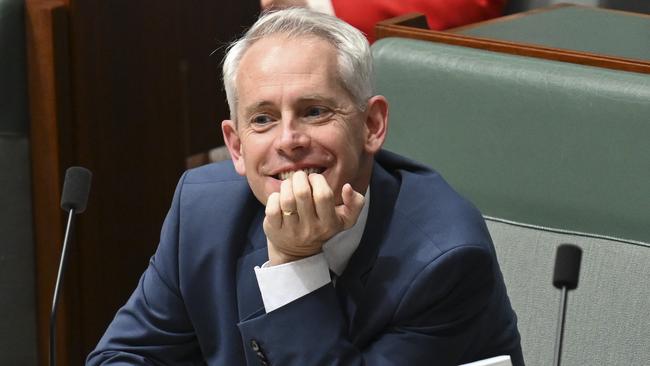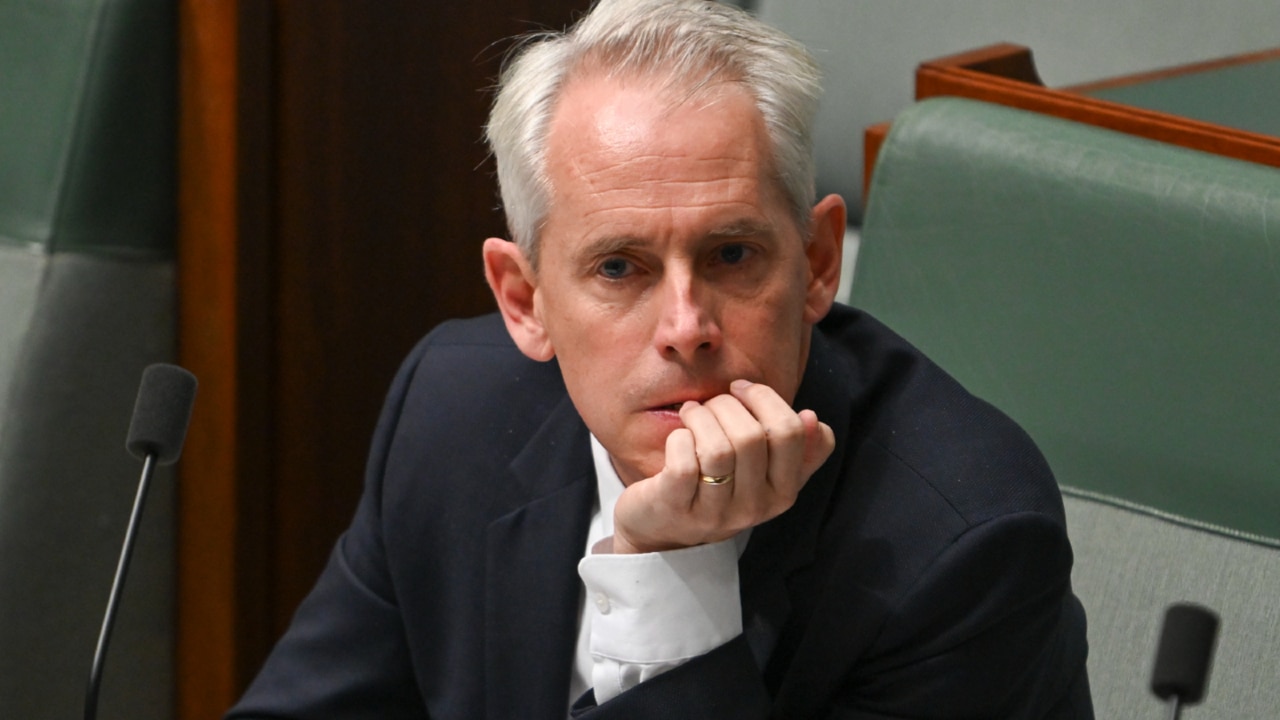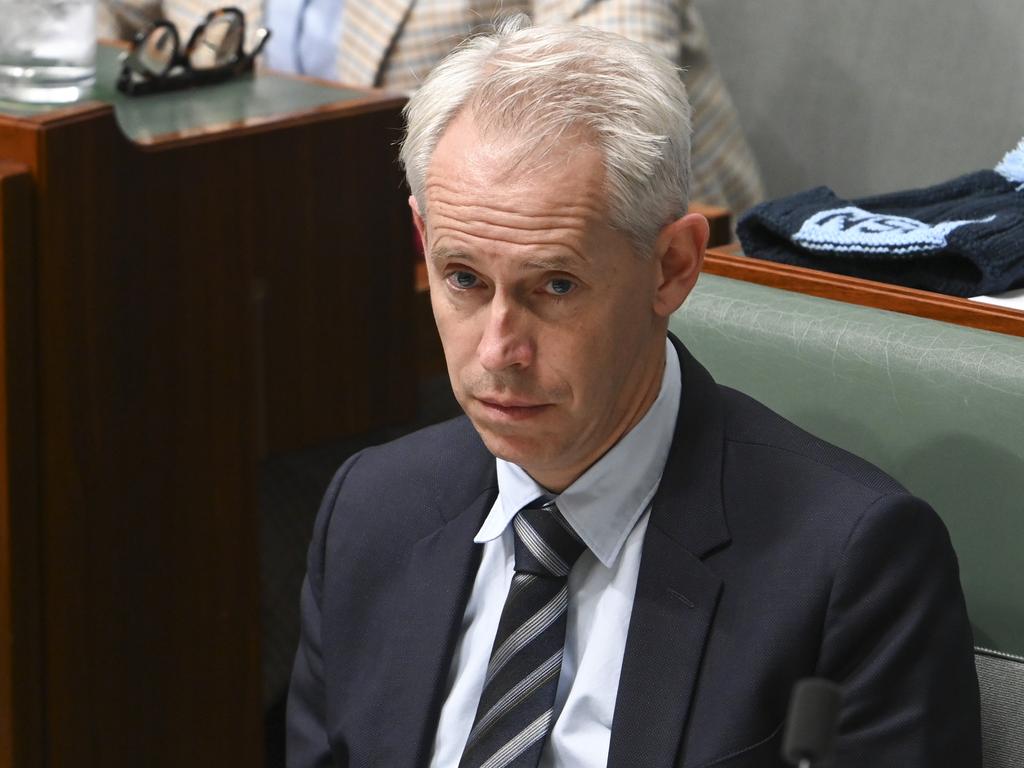Criminals seek an easy life with Andrew Giles’ wrong direction
Multiple convicted criminals let out of immigration detention as a result of last year’s NZYQ High Court decision have tried to use Andrew Giles’ Direction 99 in an effort to escape onerous curfew and monitoring conditions.

Multiple convicted criminals let out of immigration detention as a result of last year’s NZYQ High Court decision have tried to use Andrew Giles’ Direction 99 in an effort to escape onerous curfew and monitoring conditions.
The Australian has found at least five instances of the NZYQ cohort – including a convicted kidnapper, a sex offender and a repeat domestic violence perpetrator – securing favourable decisions from the Administrative Appeals Tribunal in recent months.
More than 150 people were released from detention late last year after the High Court found, through its judgment in a case brought by a stateless Rohingya man and child sex offender known only as NZYQ, that indefinite detention with no realistic prospect of removal was unlawful. The Albanese government has had to scramble to issue bridging visas to that group, with those visas including multiple conditions including curfews and electronic monitoring.
At the same time, the impact of Mr Giles’ Direction 99 – which required the AAT to make the strength of an individual’s ties to Australia a “primary consideration” when weighing up whether non-citizen criminals should be deported – has driven a spike in the number of visa cancellations being overturned by the AAT. The Australian’s unearthing of almost 100 cases of serious offenders winning deportation reprieves off the back of Direction 99 has prompted the government to scrap the direction and compelled Mr Giles to revoke dozens of visas. The government is expected to announce a new ministerial direction as early as Friday. While the individuals from the NZYQ cohort who took their cases to the AAT were bound to remain in Australia indefinitely regardless of the outcome, success could mean securing a visa with far fewer conditions than the bridging visa issued to them in the wake of the High Court decision.
At least 14 released detainees have appeared in the AAT since their release from detention, with five of those succeeding in securing AAT decisions saying that the cancellation of their original visas should be revoked. It is understood, however, that none of the five have yet had their visas restored. They include a 27-year-old Iranian citizen identified only as DLZZ, who has one conviction of kidnapping and multiple convictions of assault.

The bulk of the convictions related to an incident when he coaxed his ex-girlfriend’s new partner into a car, drove him to a house, and repeatedly bashed and threatened him. DLZZ pressed a lit cigarette against his victim’s arm and forced the man to strip, filming videos of him that he said he would keep to ensure the man stayed away from his former girlfriend. He had also been convicted over a separate incident in which he bashed a man in a church car park because the man had been speaking to his girlfriend.
In his decision overturning the earlier refusal of a “resolution of status” visa to DLZZ, AAT deputy president Stephen Boyle found that the strength, nature and duration of DLZZ’s ties to Australia weighed heavily in his favour. DLZZ arrived in Australia by boat in 2013, when he was 17 years old.
“I accept that the applicant has meaningful links to the Australian community in addition to the familial ties through his mother. I also accept that the applicant has been ordinarily resident in Australia since his formative years and that he contributed to the Australian community through his work and payment of taxes and through his involvement with his church and the Persian Fair,” Mr Boyle wrote.
While the AAT is bound to consider the protection of the Australian community as one of five primary considerations, multiple AAT members have noted that the released detainees are guaranteed to remain in the community regardless. “The consideration of the safety of the Australian community takes on a different complexion given that the Australian community will be exposed to the applicant’s behaviour irrespective of the decision that I make,” Mr Boyle wrote.
The latest revelations about the fallout from Direction 99 came as Anthony Albanese – who is considered a close factional ally of Mr Giles – twice refused to say his Immigration Minister was doing a good job. Appearing on 5AA Radio in Adelaide on Thursday, the Prime Minister passed up two opportunities to say Mr Giles was doing a good job but denied the minister needed to be sacked.
“It’s a difficult job and it is, we’ve inherited a dysfunctional department,” Mr Albanese said.
When pressed on whether Mr Giles was doing a good job, Mr Albanese said “[Mr Giles] is doing the job that he has been dealt with”. Despite the Prime Minister ruling out any “imminent” ministerial reshuffle, there is a growing belief in Canberra that Mr Albanese will use the winter break to make changes to his cabinet.
Among the other AAT decisions involving a member of the NZYQ cohort was an Iraq-born convicted rapist identified as JNMQ, who secured a decision calling for his safe haven visa to be restored in December.
JNMQ had been jailed for raping a young woman who he had employed to help care for his daughter, who suffers from spina bifida. AAT member Rob Reitano found that the man’s ties to Australia through his wife and daughter weighed heavily in his favour, and that while the fact he had spent more than half of his 10 years in Australia in jail or detention meant his time contributing to the Australian community was limited, “it counts for something”.
He also said the conditions attached to the bridging visa held by the NZYQ cohort also worked to JNMQ’s advantage.
“The legal consequence of refusing to grant the safe haven visa, the imposition upon the applicant of conditions that restrict his freedom and invade his privacy, especially those that require him to observe a curfew, be subject to ongoing monitoring and provide what would otherwise be private and personal information to the minister under pain of potential imprisonment for a minimum of 12 months are important,” he wrote.
In another case involving a recently released detainee, a man with a long criminal record including stalking, domestic violence and drug dealing won a decision for the cancellation of his refugee visa to be revoked amid concerns from the AAT that the conditions attached to the bridging visa could exacerbate his mental health issues. The 33-year-old Iraqi national HSKJ, who arrived in Australia when he was 19, had a history of trauma after being shot at, kidnapped and assaulted as a young man in Iraq. In her decision, AAT senior member Michelle Evans-Bonner said the conditions of the bridging visa would have affected HSKJ’s mental health.
“He would … face uncertainty as to how long he will be able to stay in the community (until, for example, he can be resettled to a third country), which given his history of trauma, self-harm, and mental health issues may be onerous for the applicant and has the potential to negatively impact his mental health,” Dr Evans-Bonner wrote. She also noted that the man had a two-year-old Australian daughter whom he had never met, and that as a homosexual man he would face discrimination if returned to Iraq.
The onerous conditions attached to the bridging visa were also cited in the AAT’s decision in the case of FCFF, in which a 43-year-old Iraqi citizen with a criminal record including aggravated break and enter and stalk/intimidate also secured an AAT decision to cancel the revocation of his previous visa. AAT member Linda Kirk, a former Labor senator for South Australia, found that the man’s ties to Australia through immediate family members who were either Australian citizens or permanent residents weighed in his favour.
But she also noted that the bridging visa he would have otherwise held would have prohibited him from being in contact with his brother, who was the victim of FCFF’s domestic violence offending. That, Ms Kirk found, would have adversely impacted the brother, who wanted to maintain his relationship with FCFF.








To join the conversation, please log in. Don't have an account? Register
Join the conversation, you are commenting as Logout